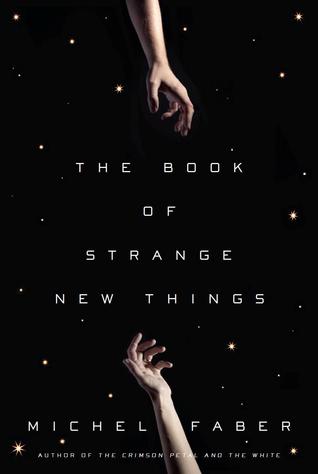Unsure of what your next book club read should be? Not sure how to get a good discussion started during book club? Don't want to waste time finding "inspirational" quotes to share with your club? You've come to the right place. We've got you covered. Today's Book Club Discussion is centered around
The Book of Strange New Things by Michel Faber.
Author information (taken from the author's website): Michel Faber has written seven other books, including the highly acclaimed The Crimson Petal and the White, The Fahrenheit Twins and the Whitbread-shortlisted novel Under the Skin. The Apple, based on characters in The Crimson Petal and the White, was published in 2006. He has also written two novellas, The Hundred and Ninety-Nine Steps and The Courage Consort, and has won several short-story awards, including the Neil Gunn, Ian St James and Macallan. Born in Holland, brought up in Australia, he lives in the Scottish Highlands.
Book inspiration: (Taken from
The Guardian)
The Book of Strange New Things, begun before Eva’s [Faber's wife]
diagnosis, also underwent a radical shift. Faber started it in the wake of the Afghanistan and Iraq wars, when “I was so fed up with the almost invincible idiocy of the human race that I fantasised about writing a book that had no humans in it. So I was going to write a novel entirely set on another planet.” Then he hit on the idea of a man and woman “separated by an unimaginably vast distance. I thought of one of them going to another planet and the other one staying behind”. Peter, who travels to the Planet Oasis to preach to the Oasans, began life as a stand-in for the writer, who every day vanishes into his study and the unpassable distances of his own mind. Eva “lived on Planet Earth, and dealt with all the messy shit of daily life, and I was on Planet Art, creating my books in my sanctum sanctorum”.
When Eva got sick, the novel changed again: “It became much more about loss and the miracle of the body and also the tragic fragility of it, all in one.” One of the many unbridgeable differences between human and Oasan is that the aliens’ bodies lack the ability to repair themselves – if damaged in any way, they simply rot, like fruit. “Eva had one of the few cancers remaining that can’t be fixed. Which is horrifying, but shines a spotlight on the fact that almost everything that goes wrong with us can be fixed. We are immensely privileged to inhabit these little fleshy vehicles.”
Discussion questions
- “Being apart was wrong. Simply lying side by side did more for a relationship than words. A warm bed, a nest of animal intimacy. Words could be misunderstood, whereas loving companionship bred trust.” - Who is at fault as Bea and Peter's relationship begins to suffer? What factors play a part in driving them apart? Are these common relationship problems or are they unique to their situation? How could this quote apply to various relationships?
- How does Faber juxtapose Bea’s hand injury (and Peter’s reaction to it) with Jesus Lover Five's hand injury (and the community’s reaction to it)? Do the differences in reactions tell us more about the differences in biology or the differences in societies?
- How does the USIC "community" differ from the Oasan village? How do each of these differ from society on Earth?
- Is it appropriate for Peter to give the Osans new names as they convert? Is it respectful of their cultural to introduce Earth religions and cultures to the Oasans?
- “How strange it was to be inside a machine again! All his life he’d been inside machines, whether he realised it or not. Modern houses were machines. Shopping centres were machines. Schools. Cars. Trains. Cities. They were all sophisticated technological constructs, wired up with lights and motors. You switched them on, and didn’t spare them a thought while they pampered you with unnatural services.” - How do Peter's opinions towards machinery and human society change through his interactions with the Oasans? Is he correct in feeling that modern machinery is "unnatural"?
- Does Peter make the correct decision in the end? Where do his duties lie? Is Earth a lost cause?
- What are your opinions on "aliens" being adopted into Earth religions? If religion is universal, should it be opened to all beings in the universe, or should Earth religions be left on Earth?
- Faber has expressed that writing this book helped him deal with the passing of his wife. What parts of the book do you think helped Faber grieve? Does the fact that Faber lost his wife while he wrote this book change your thoughts on it?
What parts of a book club meeting are important to you? What do you like to discuss during meetings? Did you enjoy The Book of Strange New Things?
